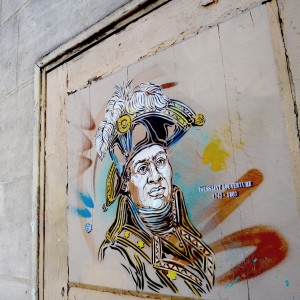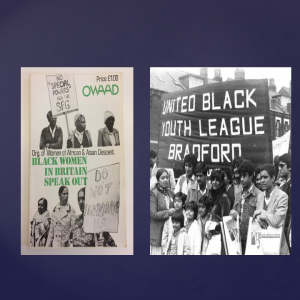
7.4K
Downloads
32
Episodes
Sociology is based on a conventional view of the emergence of modernity and the ‘rise of the West’. This privileges mainstream Euro-centred histories. Most sociological accounts of modernity, for example, neglect broader issues of colonialism and empire. They also fail to address the role of forced labour alongside free labour, issues of dispossession and settlement, and the classification of societies and peoples by their ‘stages of development’. The Connected Sociologies Curriculum Project responds to these challenges by providing resources for the reconstruction of the curriculum in the light of new connected histories and their associated connected sociologies. The project is designed to support the transformation of school, college, and university curricula through a critical engagement with the broader histories that have shaped modern societies.
Episodes

Friday Oct 16, 2020
The Haitian Revolution - Prof Gurminder K Bhambra
Friday Oct 16, 2020
Friday Oct 16, 2020
The French Revolution and the American Declaration of Independence tend to be seen as the revolutions that brought into being the modern world. While both events opened up the political process to increasing proportions of their populations and established general or universal understandings of citizenship. In this session, we consider the significance of the Haitian Revolution and discuss its contribution to the making of the modern world.
This lecture is part of The Making of the Modern World module from the Connected Sociologies Curriculum Project.
Readings
- Bhambra, Gurminder K. 2016. ‘Undoing the Epistemic Disavowal of the Haitian Revolution: A Contribution to Global Social Thought’ Journal of Intercultural Studies 37 (1): 1-16.
- James, C. L. R. 1989 [1963, 1938]. The Black Jacobins: Toussaint L’Ouverture and the San Domingo Revolution. Second Edition. New York: Vintage Books.
- May, Vivian M. 2008. ‘“It is Never a Question of the Slaves”: Anna Julia Cooper’s Challenge to History’s Silences in Her 1925 Sorbonne Thesis,’ Callaloo 31 (3): 903–918.
- Semley, Lorelle D. 2013. ‘To Live and Die, Free and French: Toussaint Louverture’s 1801 Constitution and the Original Challenge of Black Citizenship,’ Radical History Review (115): 65-90.
- Shilliam Robbie 2017. Race and Revolution at Bwa Kayiman. Millennium 45 (3): 269-292.
- Trouillot, Michel-Rolph 1995. Silencing the Past: Power and the Production of History, Boston: Beacon Press.
Resources
- Anna Julia Cooper – Global Social Theory website.
- CLR James – Global Social Theory website.
- Undoing the Silencing of the Haitian Revolution – blog by Gurminder K Bhambra.
- Dubois, Laurent 2016. ‘Atlantic freedoms: Haiti, not the US or France, was where the assertion of human rights reached its defining climax in the Age of Revolution’ Aeon.
Questions for discussion
- What is the significance of the Haitian Revolution to our understandings of modernity?
- How does the Haitian Revolution, and the idea of Black Citizenship, extend our understandings of citizenship more generally?
- What explains the silence around the events of the Haitian Revolution in standard social science understandings of modernity and citizenship?

Tuesday Oct 13, 2020
Race, Rights and Resistance - Dr John Narayan
Tuesday Oct 13, 2020
Tuesday Oct 13, 2020
This session examines how Britain possessed its own distinctive form of Black Power movement, which, whilst inspired and informed by its US counterpart, was rooted in anti-colonial politics, New Commonwealth immigration, and the onset of decolonisation. The session also explores how British Black Power offers valuable lessons about how the politics of anti-racism and anti-imperialism should be united in the 21st century.
This lecture is part of the British Citizenship, Race and Rights module from the Connected Sociologies Curriculum Project.
Reading
- Angelo A. M. 2009. ‘The Black Panthers in London, 1967-1972: A Diasporic Struggle Navigates the Black Atlantic’ Radical History Review 2009 (103): 17-35
- Bunce, R. and Field, P. 2013. Darcus Howe: A Political Biography. London: Bloomsbury Academic.
- Narayan, John 2019. ‘British Black Power: the anti-imperialism of political blackness and the problem of nativist socialism.’ The Sociological Review. Volume: 67 issue: 5, page(s): 945-967
- Trew, W. N. 2010. Black for a Cause…Not Just Because… Derbyshire: Derwent Press.
- Waters, R. 2018. Thinking Black: Britain, 1964-1985. Oakland: University of California Press.
- Wild, R. 2008. “Black was the colour of our fight.’ Black Power in Britain, 1955-1976.” Ph.D. diss., University of Sheffield.
Resources
- Ashley John-Baptiste, The Mangrove Nine. Echoes of Black Lives Matter from 50 years ago, BBC News, 14 August 2020.
- Olaloku-Teriba, Annie 2020. ‘Political blackness and Palestinian solidarity’ Red Pepper.
- The British Black Panthers – BBC Radio 4 Documentary on British Black Panthers.
- Tell a Friend Podcast – Oral History/ Interviews with a variety of former British Black Power activists.
- Remembering Olive Collective – blog/website documenting work of Remembering Olive Collective’s work on Olive Morris.
- Special Branch Files – collection of state documents on British Black Power and attemptes to disrupt British Black Power Groups.
Questions for discussion
- Why did Black power find resonance in Britain? How did the expression of Black Power in Britain differ from its US counterpart?
- How did British Black Power narrate racism in Britain as link to other anti-racist and anti-imperialist struggles around the world? What does this mean for how we conceive anti-racism?
- To what extent is British Black Power’s idea of intercommunal anti-racist solidarity important today? What can we learn from this era?
